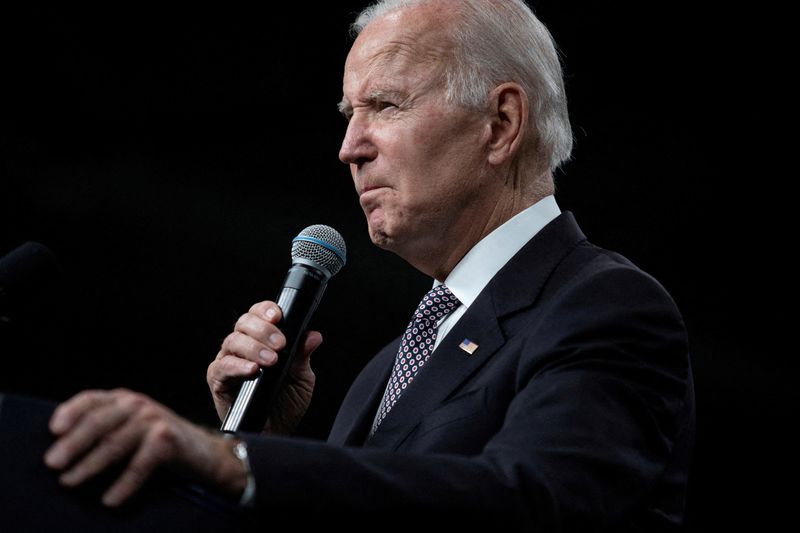By Brendan Pierson
(Reuters) - U.S. President Joe Biden has said he would pardon people convicted in federal court of simple marijuana possession, and that his administration is reconsidering the classification of cannabis, which has been in the most dangerous category of drugs.
The move has been welcomed by some as a long-overdue reform, but the effects of reclassifying marijuana are not clear, and could end up meaning more regulation rather than less.
HOW MANY PEOPLE WILL BE AFFECTED BY THE PARDON?
Relatively few people in the United States are convicted of simple possession in federal court. Most are convicted of more serious trafficking offenses, which are not covered by the pardon. A senior administration official said more than 6,500 people with prior federal convictions could be affected by the pardons. While none of them is currently in prison, clearing their convictions could remove barriers to finding jobs or housing.
The vast majority of marijuana prosecutions take place at the state level, where each state has its own laws ranging from criminalization to full legalization, and will not be affected.
HOW COULD MARIJUANA BE RECLASSIFIED?
Marijuana is currently classified as a so-called Schedule I drug under the federal Controlled Substances Act, meaning its possession is almost entirely banned except for certain research purposes. The classification is the same as that of heroin used for drugs deemed to have no legitimate medical uses.
Moving marijuana to a lower tier on the Controlled Substances Act schedule would allow it to be prescribed by doctors. If it became a Schedule II drug, like most opioids used for pain management, those prescriptions would still be tightly controlled by the Drug Enforcement Administration. If it were moved to Schedule V - the lowest tier - it would be minimally controlled, like cough syrups containing small amounts of codeine.
Biden has not expressed a view about where marijuana should fall. The decision is ultimately made by the DEA, with input from the Food and Drug Administration.
HAVEN'T MANY STATES ALREADY LEGALIZED MEDICAL MARIJUANA?
Yes. Thirty-seven states regulate cannabis for medical use, and 19 also allow recreational use.
However, existing state medical marijuana programs would still conflict with federal law if marijuana were rescheduled, according to Alex Kreit of the Salmon P. Chase College of Law at Northern Kentucky University.
Doctors in some states are currently permitted to recommend, rather than prescribe, marijuana for certain medical conditions, since only the FDA can approve prescription drugs. The agency has not approved, and does not regulate, the products dispensed under state law.
Rescheduling marijuana as a prescription drug would mean marijuana products sold as medicine would be subject to FDA regulation, and doctors would have to follow the same regulations that apply to other drugs in their state. Though once approved by the FDA for any medical use, doctors can prescribe a drug for other conditions, so-called off-label use.
"Big pharma might be the big exciting player here, because they have the most to gain if we were to reschedule but it was still something that was very highly regulated," said Douglas Berman, a professor at Ohio State University's Moritz College of Law.
WHAT ABOUT STATES THAT HAVE LEGALIZED RECREATIONAL MARIJUANA?
Selling marijuana for recreational use would still be prohibited by federal law unless it were removed from the schedule entirely. Kreit said that was unlikely, since the Controlled Substances Act requires all drugs with potential for abuse to be scheduled, except alcohol and tobacco.
In recent years, federal authorities have declined to enforce marijuana prohibition within states where it is legal.
Even if marijuana were descheduled, Congress would likely intervene to impose some control, as it has for tobacco, Kreit said.
States could still ban marijuana even if the federal ban were lifted.
HOW COULD RESCHEDULING AFFECT HOW MARIJUANA BUSINESSES OPERATE?
Marijuana businesses have been in limbo for years. Despite the lack of federal enforcement, financial institutions have continued to shy away from them even in states that have fully legalized the drug for fear of running afoul of federal laws.
Jim Thorburn, a lawyer who represents marijuana businesses, said that would not necessarily change if marijuana were rescheduled.

"Recreational use would still be problematic because that could still be considered unlawful drug trafficking," he said. Still, Thorburn said a regulatory regime that created more avenues for legal marijuana might ease access to the financial system.
Kreit also said that rescheduling the drug "could give more banks and financial operators more confidence and comfort" in dealing with marijuana businesses.